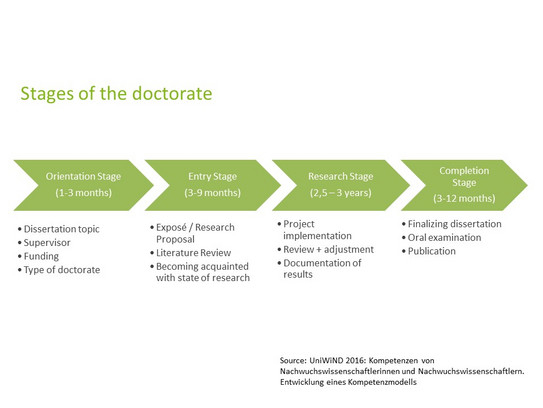Why do a doctorate?
In order to answer this question in a well-founded way, one must first know the benefits and challenges of a doctorate. Then you can compare these with your own values, preferences and competencies.
The doctorate in a nutshell
A doctorate is a research project lasting several years and is proof of the ability to carry out independent research. In fact, for doctoral researchers it is usually more than “just” the preparation of a scientific paper: it is a period of life of 4.5 years on average, a time of independent research and networking, the start of a career. In contrast to studying, the focus is no longer on learning existing knowledge, but on creating new knowledge.
A professor (often also called “Doktorvater/Doktormutter” i.e. the doctoral supervisor) supervises the research project of the doctoral researcher, ensures the quality of the research and promotes professional qualification.
Proof of the ability to conduct independent research is usually provided by a piece of writing (dissertation), an oral examination (disputation, viva voce, defense), and successful participation in a structured doctoral program. You can find the specific requirements for a doctorate in your discipline in the doctoral regulations of your Department.

Doctorates can vary greatly depending on the discipline and research question. Nevertheless, there are some elements that play a role in most doctoral processes. The following diagram gives an impression of the common stages and milestones.
The doctorate is a research project lasting several years. To master it successfully, a combination of different knowledge and skills is required. In addition to professional expertise, personal qualities, and skills such as motivation, self- and project management, communication, creativity, and perseverance are crucial. Transferable skills you can also acquire in the course of a doctorate.
In every doctorate there will also be setbacks – the proper handling of these situations is an important component of success. Good self-management, the ability to motivate yourself, and stamina are important skills to complete your own research project successfully.
Many other criteria such as personal networks, presentation and communication skills, and the visibility of one's own research are decisive for long-term scientific success.
A „Promotions-Test” (“doctoral test”; available only in German language) developed by the Psychological Institute of the University of Heidelberg can help you with an initial orientation for the decision to pursue a doctorate. This test is concerned with characteristics and qualifications relevant to a doctorate.
With personal advice and a counseling, the Graduate Center TU Dortmund supports prospective doctoral researchers in their decision-making process.
First, ask yourself the question: Why are you interested in a doctorate?
Frequently mentioned reasons for a doctorate are:
- Interest in a specific research question
- Enjoying research and wish to start a career in science
- Doctorate as additional qualification for a career in business / industry
- Professor has offered a doctoral position
- Expectations from family and environment
Most persons with a doctoral degree like to look back on their doctorate as an intensive, challenging, exciting, and independent time for professional and personal development. At the same time, this phase also entails special challenges:
- A long period (on average 4.5 years) of intensive, demanding, very independent work,
- Demands on your own motivation and management skills,
- The frustration experiences that are inseparable from science,
- Occasionally uncertain financing, especially for doctorates of more than 3 years, and possibly lower salaries compared to an employment outside of academia.
You can obtain further information on a possible doctorate through our personal advice and information events. In any case, you should also consult with professors and other researchers in your Department.
The decision for or against a doctorate is also strongly influenced by one's social background: So-called first-time academics who are the first in their family to complete a degree, but also people with a history of migration, are much less likely to begin a doctorate. The TU Dortmund University is making efforts to reduce such barriers. For further information, you can contact the Graduate Center for personal advice.
Doing a doctorate – The right choice for me?
Towards the end of the Master's program, many students face the question of whether they should do a doctorate after completing their studies. There is no general answer to this question.
Doing a doctorate offers you the opportunity to deal intensively with an exciting and complex field of research. In addition, it opens up or facilitates many challenging professional perspectives.

However, the doctorate is also a very challenging, multi-year phase of scientific qualification. The Graduate Center supports you throughout the process with information events and personal advice. In any case, you should also consult with professors and other doctoral researchers in your Department.
Further topics
![[Translate to English:] Doktorand/-in werden Kreidezeichnung der Karrierestufe Promotionsinteressierte](/storages/forschungsfoerderung/_processed_/9/8/csm_promotionsinteressiert_menu_8caac08ee6.jpg)
Become a doctoral researcher

Financing your doctorate

International dcotoral researchers

Advice and information

Events






